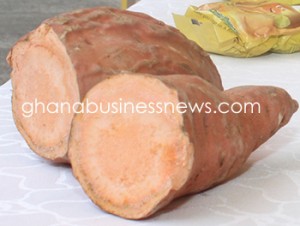Farm Radio International launches orange-fleshed sweet potato in Ghana
 A project by Farm Radio International, a Canadian-registered NGO that serves smallholder farmers through community radio, is popularizing the growth and consumption of orange-fleshed sweet potato to combat Vitamin A deficiency.
A project by Farm Radio International, a Canadian-registered NGO that serves smallholder farmers through community radio, is popularizing the growth and consumption of orange-fleshed sweet potato to combat Vitamin A deficiency.
The orange-fleshed sweet potato differs from the traditional African sweet potato and is bright orange under the peel due to a high presence of beta carotene which is necessary for Vitamin A production.
According to Mr Ben Fiafor, Farm Radio International’s Country Director for Ghana, over two million cartons of vine from four multipliers were distributed in the Central Region, a thousand from eight multipliers in the Volta Region, and 160 cartons of vine to farmers in the Upper East.
Speaking at the event jointly organised by Farm Radio International and the Editors Forum, Ghana, a GJA-affiliated group of editors and senior journalists, Mr Fiafor said Vitamin A deficiency is a challenge in sub-Saharan Africa, affecting 43 million children and claiming the lives of about 670,000 children annually while an estimated 250,000 to 500,000 children in developing countries also go blind each year from it.
Sixty per cent of children under six in Ghana are estimated to suffer from sub-clinical Vitamin A deficiency putting them at greater risk of measles, respiratory and diarrheal infections, decreased growth and slow bone development, and decreased likelihood of survival from serious illness.
Mr Fiafor said that realizing this, Farm Radio International approached the Bill and Melinda Gates Foundation, Helen Keller International, International Potato Centre and the Sweet Potato Action for Security and Health in Africa (SASHA) to carry out this project to fight Vitamin A deficiency with the crop.
The project was carried out in the Central, Volta, Northern and Upper East regions with support from the Ministry of Food and Agriculture, and an advisory group of representatives from various institutions such as the University of Development Studies, Kwame Nkrumah University of Science and Technology, Women in Agricultural Development and the Ghana Health Service.
After two years, the project has achieved in addition to the distributing of vines for planting, 360 hours of information on nutrition and health broadcast in local languages.
Various food products of the OFSP were exhibited by farm radio including bread, cakes, biscuits and other pastris, beverages, ice cream and leaf soup.
The crop’s peels can also be used in brewing an alcoholic beverage.
Mr Kwadwo Adofo, a sweet potato breeder of the Crop Research Institute said the orange-fleshed sweet potato’s starch is also among the most preferred by pharmaceutical companies.
The chairperson of Editors Forum, Ghana, Ms Ajoa Yeboah-Afari said if the campaign for the highly reputed orange-fleshed sweet potato succeeds, it would have “exciting pospects for agriculture, Ghana’s food industry, and ultimately the rural as well as the national economy.”
A variety of food products prepared with the potato was showcased during an exhibition.
By Emmanuel Odonkor
